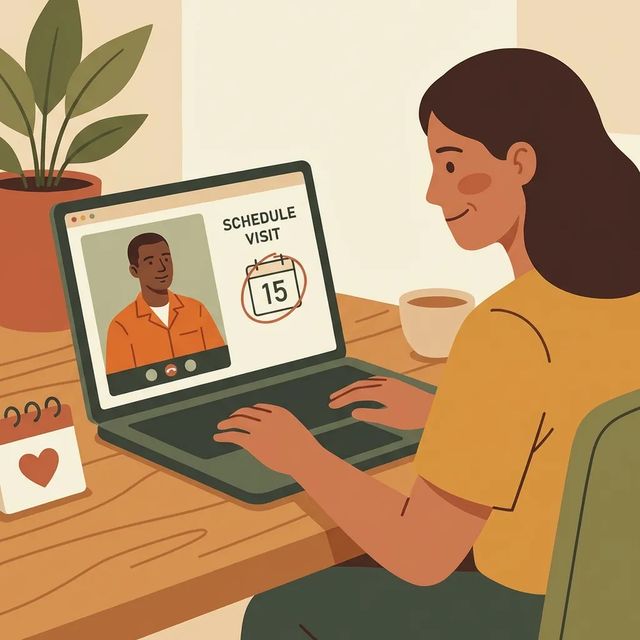Deuel Vocational Institution, CA
Explore
Find an Inmate at Deuel Vocational Institution, CA
Search for a loved one and send messages and photos in minutes.

Guides for This Facility

How to Visit Facility
Planning ahead makes visiting easier. You can schedule and manage visits through the CDCR GTL VisitMe site, so you'll have a confirmed time before you go.
Read Guide
How to Send Money to Facility
Sending money gets confusing fast when different systems handle visitation and communication. Here's what you can do right now, and what you'll need to confirm before making a deposit.
Read Guide
Preserve photos & messages — and request refunds — before Deuel Vocational Institution’s tablet switch
If your loved one is at Deuel Vocational Institution (DVI), take a few minutes now to protect what you've purchased through ViaPath and handle any unused balances before the tablet switch.
Read GuideAt a Glance
Visitation
- You can sign in to schedule and manage upcoming visits and reserve visitation time to skip long lines.
- When scheduling, you can select the date, time, and location and visits are confirmed instantly.
- The scheduling site provides a 'Forgot your password?' link for returning users.
Communication
- Securus is the new communications provider for CDCR, which includes services at Deuel Vocational Institution.
- Securus plans to implement telephone calls, video calls, and electronic messaging at Deuel beginning in September.
- Families must open a Securus account (web or mobile); an online account will be required for future video and messaging services.
Sending Money
- Securus instructs families to open an online or mobile account for video and messaging services.
- New users on the visitation scheduling site are prompted to 'Claim Account' before they can schedule visits.
- You can typically add money through online/mobile portals, phone deposits, lobby kiosks, or U.S. Postal money orders, but availability depends on the facility or county.
Based on official sources and community feedback. Learn how we verify
Topic Overviews
Visitation
Deuel Vocational Institution handles visits through an online scheduling portal. New users should select "Claim Account" and follow the prompts to register before booking. Once signed in, you can schedule and manage upcoming visits, including reserving a specific time to skip long lines. Choose your visit's date, time, and location, then submit for instant confirmation. Locked out? Use the "Forgot your password?" link to reset your access. For the rest of your prep (acceptable IDs, visitor-list rules, and device options for video visits), check the portal and the facility's visiting checklist.
Read full guideCommunication
Securus is CDCR's new communications provider. Phone calls, video calls, and electronic messaging are rolling out at Deuel Vocational Institution starting in September. To use these services, create a Securus account through the website or mobile app. Planning to receive prepaid video calls? Add funds using AdvanceConnect, turn on Video Connect in your account, and register to "Allow videollamadas" so the incarcerated person can call you. Securus Video Connect is web-based, letting families, attorneys, and officials schedule and join video sessions from an app, computer, or tablet. For tablet timing and cost details, Securus directs families to the CDCR tablets page.
Read full guideSending Money
Adding money for someone at Deuel Vocational Institution starts with picking a deposit method and confirming what the facility or payment vendor accepts. Common options include online or mobile portals, phone deposits, lobby kiosks, or U.S. Postal money orders, though availability and processing times vary. Before you begin, have the incarcerated person's full name and booking or facility ID ready, then follow the instructions for your chosen method. For communication services, Securus requires families to open an online account for video and messaging, and visitation scheduling pages may prompt new users to "Claim Account." Those steps are tied to communication and scheduling. Confirm separately whether an online account is required for money deposits.
Read full guideCommon Questions
Showing 6 of 9How do I create an account to schedule visits at Deuel Vocational Institution?
Use the scheduling portal’s “Claim Account” option to register as a new user. Follow the on-screen prompts to complete registration before booking visits.
VisitationCan I reset my password for the Deuel visitation site?
Yes. Use the “Forgot your password?” link on the scheduling site to reset your password and regain access.
VisitationHow do I reserve a visit or skip the line at Deuel Vocational Institution?
Sign in to the scheduling portal, choose the date, time, and location, and reserve a visitation time to help you skip long lines. After you complete scheduling, the portal confirms visits instantly.
VisitationHas Deuel Vocational Institution switched to Securus for inmate communications?
Yes. Securus is CDCR’s new statewide communications provider, and phone, video, and messaging services at Deuel are scheduled to begin rolling out starting in September.
CommunicationDo I need a Securus account to receive video calls or messages from someone at Deuel?
Yes. Securus requires you to open an online account (web or mobile), and you'll need one for future video and messaging services.
CommunicationHow do I get and schedule video visits with someone at Deuel?
Set up your Securus account, add funds through AdvanceConnect for prepaid video calls, enable Video Connect, and register to "Allow videollamadas" so calls can reach you. Then use Securus Video Connect (web or app) to schedule and join sessions from a computer, tablet, or phone. Check the CDCR tablets page for rollout timing and cost info.
CommunicationMore Guides
Ready to Connect?
Search for your loved one to start communicating today
Did You Know?
Deuel Vocational Institution lets you sign in online to schedule and manage visits with an inmate. Reserving a time slot helps you skip long lines.
This guide is compiled from official facility documentation and community feedback. Learn how we verify
